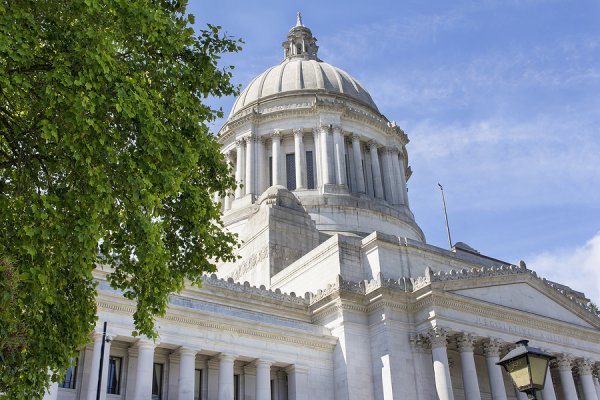Tomorrow’s the last day for policy committees to pass out bills from the opposite chamber. Check in on the cutoff calendar here. We’re also in the throes of budget season, and the Capitol is absolutely buzzing as legislators work to align priorities, policy, funding, and revenue sources. More on that in this edition of Morning Wire.
Want us to look into something you haven’t seen us cover? Send a tip.
Happy Tuesday!
With help from Emily Boerger and DJ Wilson
1. Operating budget proposals: Senate vs. House

Last week, House Democrats passed a $52.8 billion operating budget off the floor, and Senate Dems released a $52.2 billion proposal. Both prioritize funding similar efforts (I highlight a few differences in how they fund one of the biggest agencies here), and both include a graduated real estate excise tax and other tax changes—a fact drawing criticismfrom the other side of the aisle, in a biennium with strong revenue projections.
One takeaway: The chambers differ in how they approach a capital-gains tax, the most attention-grabbing tax proposal up for debate. The House budget relies on the tax, while the Senate’s is part of what they’re calling the “Fix Our Tax Code Plan,” a striking amendment to a Senate bill. Senate Dems say the revenue from the tax would go toward tax reductions “for less wealthy Washingtonians,” including the Working Families Tax Credit, a “small business tax cut,” a property tax reduction for seniors, and the elimination of sales tax on products like diapers and feminine hygiene products.
2. Q&A: Hilary Franz, Commissioner of Public Lands

A bill dropped last week would create a dedicated funding source for wildfire suppression and forest health in Washington. A 0.52% tax increase on property and casualty insurance premiums would generate an estimated $62.5 million per year for the account. I talked to Commissioner of Public Lands Hilary Franz about projects the dedicated source would fund, why she thinks upping the tax is justified, why only Dems are sponsoring the bill, and when we might notice clearer skies if it passes.
“This is no longer an east-side issue or west-side issue,” Franz said. “It is, very much, a Washington State issue. And, without action, this will be our new normal. And we will continue to spend hundreds of millions of dollars a year—not only fighting those fires, but we will also face the significant cost to our economy of losing our forest lands that are critical for our rural communities and economies, and our homes.”
3. Wire Insider: Tina Podlodowski

Tina Podlodowski is the Chair of the Washington State Democratic Party. She joins us as a “Wire Insider” to discuss the work the party’s been doing in local elections and recruiting candidates.
“Far more of these kinds of candidates that you see at the local level, too, are going to be folks that we recruit that are diverse,” Podlodowski said. “So, women, people of color, folks from the LGBTQ community, immigrants—people that have not necessarily held elected office before, because the bench needs to change to fully represent the changes that are happening in the demographics in Washington State.”
4. Q&A: Sen. David Frockt on Cascade Care

Sen. David Frockt is the prime sponsor of the Senate’s public option bill, often referred to as Cascade Care. The Cascade Care bills from each chamber are still alive and evolving: The House bill passed out of the Senate Health & Long Term Care Committee yesterday, and the Senate bill is scheduled for executive session in the House Health Care & Wellness Committee today. In this Q&A, Sen. Frockt told me what’s changed and what’s still changing.
Thanks to a striking amendment from Frockt, the two bills look the same following yesterday’s executive session. Frockt says that reimbursement rates remain central to discussions. As for next steps, he was clear the work isn’t over, saying, “I think there’s going to be some pretty intense negotiations and work over the next 30 days.”
5. Transportation budget proposals: Senate vs. House

Last week, we braced for what we thought might be a showdown between the Senate and House Transportation budget proposals, considering the $17 billion package Senate Transportation Committee Chair Steve Hobbs floated earlier this session that included a carbon fee.
In the words of the AP’s Tom James, the Senate’s budget actually “broadly mirrors” the House proposal that ultimately passed off the floor last week. Both chambers proposed $9.9 billion budgets, and both have bipartisan buy-in. There’s one mention of Hobbs’s Forward Washington plan in the Senate’s budget; a carbon fee would only stick around if the Forward Washington package passes.
Your support matters.
Public service journalism is important today as ever. If you get something from our coverage, please consider making a donation to support our work. Thanks for reading our stuff.












